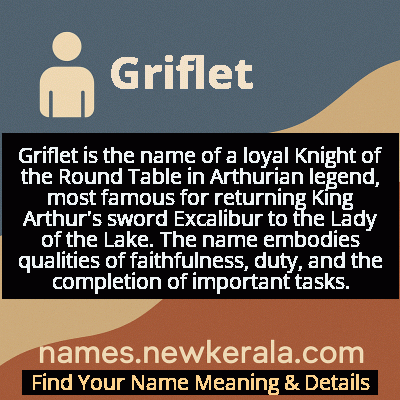Griflet Name Meaning & Details
Origin, Popularity, Numerology Analysis & Name Meaning of Griflet
Discover the origin, meaning, and cultural significance of the name GRIFLET. Delve into its historical roots and explore the lasting impact it has had on communities and traditions.
Name
Griflet
Gender
Male
Origin
Arthurian
Lucky Number
5
Meaning of the Name - Griflet
Griflet is the name of a loyal Knight of the Round Table in Arthurian legend, most famous for returning King Arthur's sword Excalibur to the Lady of the Lake. The name embodies qualities of faithfulness, duty, and the completion of important tasks.
Griflet - Complete Numerology Analysis
Your Numerology Number
Based on Pythagorean Numerology System
Ruling Planet
Mercury
Positive Nature
Adventurous, dynamic, curious, and social.
Negative Traits
Restless, impatient, inconsistent, prone to indulgence.
Lucky Colours
Green, white.
Lucky Days
Wednesday.
Lucky Stones
Emerald.
Harmony Numbers
1, 3, 9.
Best Suited Professions
Sales, marketing, travel, entertainment.
What People Like About You
Versatility, charisma, adventurous spirit.
Famous People Named Griflet
Sir Griflet
Arthurian Knight
One of the first Knights of the Round Table and trusted companion of King Arthur
Griflet le Fise de Dieu
Arthurian Knight
Known for returning Excalibur to the Lady of the Lake after Arthur's final battle
Griflet the Younger
Knight of the Round Table
Participated in numerous quests and battles alongside Arthur and other knights
Name Variations & International Equivalents
Click on blue names to explore their detailed meanings. Gray names with will be available soon.
Cultural & Historical Significance
In medieval literature, particularly in the Vulgate Cycle and Post-Vulgate Cycle, Griflet appears as a consistent and reliable knight, often serving as Arthur's companion from youth. His character development across various texts shows him evolving from a young squire to a seasoned knight who witnesses the rise and fall of Camelot. The act of returning Excalibur positions him as a guardian of Arthurian legacy, ensuring that the magical sword returns to its mystical origins rather than falling into unworthy hands.
Griflet's role extends beyond mere knightly service; he embodies the concept of faithful stewardship. In returning Excalibur, he completes the circle that began when Arthur received the sword, representing the importance of honoring commitments and maintaining traditions even in times of collapse and despair. This makes him not just a knight, but a symbolic figure of continuity and respect for the natural order of things.
Extended Personality Analysis
Griflet is characterized by unwavering loyalty and steadfast devotion to King Arthur and the ideals of Camelot. As one of Arthur's earliest companions, he demonstrates profound faithfulness that withstands numerous trials and challenges throughout the Arthurian saga. His personality reflects the classic medieval virtues of courage tempered with humility, making him a reliable rather than flashy knight who serves consistently without seeking personal glory or recognition.
Beyond his loyalty, Griflet exhibits a strong sense of duty and responsibility, particularly evident in his final act of returning Excalibur. This action reveals a knight who understands the importance of tradition, ritual, and proper conduct even in moments of great personal grief and national tragedy. His character suggests a thoughtful, principled individual who values honor above personal ambition and who possesses the emotional strength to carry out difficult but necessary tasks.
Throughout the legends, he maintains a balanced temperament—neither overly aggressive nor passive—making him one of the more stable and dependable figures in Arthur's court. This consistency in character positions him as the ideal person to perform the solemn duty of returning the sword, as he represents both the beginning and end of Arthur's reign with equal dedication and respect.
Modern Usage & Popularity
In contemporary times, Griflet remains an extremely rare given name, primarily used by Arthurian enthusiasts, historical fiction authors, or parents seeking unique names with medieval literary connections. The name sees occasional usage in fantasy literature and gaming communities where Arthurian themes are popular, though it has never appeared in official baby name statistics due to its extreme rarity. Its usage trends show it appearing more frequently as a character name in novels, video games, and tabletop RPGs than as an actual given name. The name's obscurity makes it appealing to those seeking distinctive names with rich mythological background but prevents it from gaining mainstream popularity. Modern bearers of the name are almost exclusively found within communities interested in medieval literature, historical reenactment, or fantasy fandom, where it serves as a marker of specialized knowledge and appreciation for Arthurian lore.
Symbolic & Spiritual Meanings
Griflet symbolizes faithful service, the completion of sacred duties, and the preservation of legacy. His most defining act—returning Excalibur to the lake—represents the proper conclusion of cycles, the respectful handling of power, and the understanding that some things must return to their origins. The name carries connotations of being a 'keeper of endings' and a guardian of transitions, embodying the idea that true loyalty sometimes means carrying out difficult final duties rather than seeking continued glory.
Metaphorically, Griflet represents the often-overlooked but essential supporting figures who ensure that great stories conclude properly. He symbolizes the virtue of seeing tasks through to their conclusion, even when the original purpose or people are gone. The act of returning the sword also suggests themes of releasing power, acknowledging when eras end, and maintaining ritual and tradition in the face of chaos and destruction. His character serves as a reminder that completion and closure are as important as beginnings and that some roles require the strength to let go rather than to possess.

